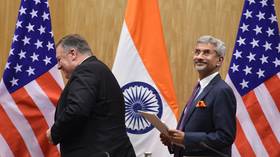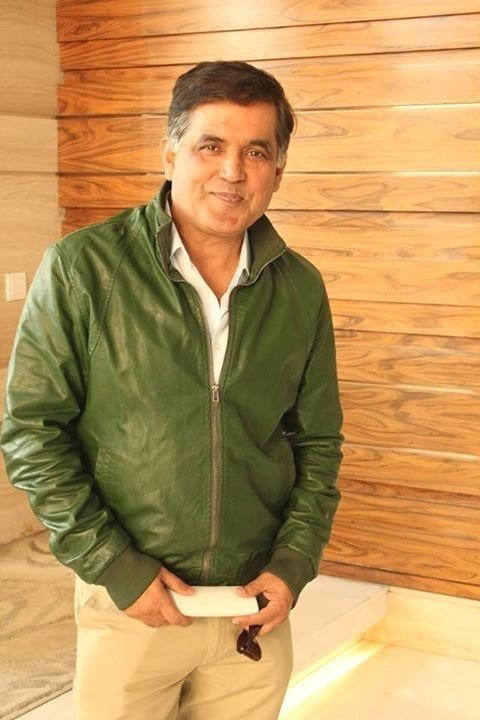Friends or foes? As India gears up to talk to the West, meet the architect of its new ‘India first’ foreign policy

While the US and India currently enjoy historic levels of economic and defense cooperation, the two nations have locked horns on a range of issues, prompting New Delhi to chart its own course in pursuit of national interests.
As India awaits two major events in its political calendar, a visit from US President Donald Trump next week and a summit between Prime Minister Narendra Modi and EU leaders in Brussels next month, it is tempting to see the burgeoning superpower integrating itself into the Western fold. Especially given the multibillion-dollar arms deal Modi and Trump are expected to ink during the US leader’s visit.
But to assume that New Delhi has decided to wholeheartedly embrace the West would be wrong.
Far from bending the knee, New Delhi has begun to pursue independent economic and foreign policies, a move largely unappreciated in the West. India’s Foreign Minister Dr. Subrahmanyam Jaishankar is one of the chief architects of these policies, yet few have picked up on the hints he’s dropped on the doorsteps of Europe and the US.
Shooting from the hip
Jaishankar’s exchanged the life of a diplomat with that of a politician at the insistence of Modi last May. Just a few short months later, India had rewired the state of Jammu and Kashmir, and Dr. Jaishankar has been shooting from the hip since.
When US Senator Lindsey Graham appealed for a “democratic” resolution to the Kashmir crisis during the recently-concluded Munich Security Conference, Jaishankar fired back with a fitting retort.
“Do not worry, senator. One democracy will settle it and you know which one,” he told the South Carolina Republican.
In December, Jaishankar rebuffed a call by the US House Foreign Affairs Committee to hold a meeting with Democratic lawmaker Pramila Jaypal. His reason? Jaypal had introduced a resolution in the House of Representatives against India on Jammu and Kashmir. When Capitol Hill wanted a congressional hearing on Kashmir last October, Jaishankar used his own channels to make sure that no less than 10 US congressmen abstained from appearing in the hearing.
He has been equally unsparing in his criticism of the United Nations, telling a Washington think tank in October that a UN Security Council without India “affects the United Nations’ credibility.” With India set to become the “most populous country in the world… and the third-largest economy,” Jaishankar declared that if the UN failed to recognize the new order, it could lose "legitimacy, vitality, and efficiency.”
Also on rt.com Art of the deal? Trump boasts Facebook supremacy over Modi ahead of India visit to ink trade & weapons salesWashington’s reaction
While a lucrative arms deal with Modi’s government may be music to Washington’s ears, it’s not just Jaishankar’s statements that signal a country charting its own course. India’s actions and the US’ reactions demonstrate that India is willing to defy the mighty US, and that the US is willing to punish her for it.
On the economic front, India has come under fire from Trump’s global trade war. The US president dubbed India the “king” of tariffs and withdrew New Delhi’s special trade privileges last year, affecting some $5 billion worth of Indian goods. The move sparked a tit-for-tat response from India, which raised tariffs on 28 American products.
Washington has further sought to prevent India from doing business with Iran and Russia, a stance which undermines India’s energy and security interests. Meanwhile, New Delhi continues to brush off threats of US sanctions for its decision to purchase Russian S-400 anti-air systems.
Also on rt.com Pampering Melania? New Delhi enlists all-female team with refined etiquette to assist first lady during India visitGeopolitical shift
In Jaishankar’s worldview, the post-1945 bipolar world and the post-1992 American unipolar world are no longer applicable. “Things change, nothing is engraved in stone. This world will be different, power will be more dispersed, there will be more actors,” he confided to a French newspaper last November. He also feels India and China have a common interest in re-balancing the US-dominated world order.
“Multilateralism can today be strengthened by more creative diplomacy and plurilateral understanding,” he said while speaking in Munich last weekend.
Jaishankar is only taking cues from his boss Modi, who once ticked off Trump in a joint media interaction session by stating India wouldn’t like third-party mediation on Kashmir. Trump has alluded to variations of “mediation/arbitration/interventions” on Kashmir at least seven times in as many months and India has never failed to ask the US to back off.
All of this assertiveness and talk of a multipolar world may leave a bad taste in American mouths, but the US itself has an “America first” foreign policy. The entire world is looking to protect its own interests as postwar multilateralism wanes. The US has heard some plain speaking, not just from Russia or Iran but also from its so-called close allies in Europe (France), Asia (the Philippines) and the Middle East (Turkey, Saudi Arabia) in recent times.
Thus India and the US will forge economic and defense ties which suit both parties; cameras will click in New Delhi next week, headlines will be written celebrating the warmth between Narendra Modi and Donald Trump, but both will go their own way when it comes to their global policies. At least India is letting the US know to mind its own business, even though the latter isn’t quite giving up its instincts for intrusive behavior.
Think your friends would be interested? Share this story!
The statements, views and opinions expressed in this column are solely those of the author and do not necessarily represent those of RT.
















